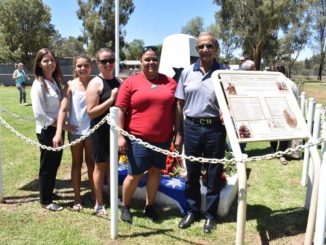
Cobar residents came together just before 11am on Saturday in Drummond Park to mark the 11th hour, of the 11th day of the 11th month, the day when the guns fell silent on the Western Front in World War I in 1918.
Cobar RSL Sub Branch president Ben Hewlett led this year’s commemoration service and spoke about the significance of Remembrance Day.
“On Anzac Day we stand to remember the Australians born into the baptism of fire at Gallipoli; on Remembrance Day we stand to remember the end of war and the promise of peace,” Mr Hewlett said.
“While Anzac Day is a very special thing for us as Australians and our New Zealand brethren, Remembrance Day is observed as a Commonwealth; it’s observed here, New Zealand, it’s observed back in England and it’s observed in Canada.
“And when we talk about the forging of spirit for Anzac, Remembrance Day is coming together to remember the promise of peace that brought together the nations to end the war, the first great war, on this day 99 years ago.”
Mr Hewlett said Australia was a very different place when WWI broke out in 1914 with a population of less than five million people, and of those, 416,000 men and women enlisted at the beginning of the war.
“Back then that represented about 10 per cent of the population. So to put that into today’s numbers, that would be about 2.4million people enlisting for war today,” he said.
“Of those 416,000, 60,000 would never come home and 156,000 were wounded.
“And of those that did come home, they were coined with phrases like “shell shocked” something today which we call PTSD.
“And those that recount the stories of those who came home from war, they were a very, very different person and were for the rest of their days.
“Of all the Commonwealth nations who committed men and women to war in the first great war, New Zealand dedicated the highest percent of any population, and they also lost the highest percentage of any population and it’s today we remember our brothers and sisters in arms whereas for the rest of the year we might fight with them over football and cricket.”
Mr Hewlett reflected on the fighting and great battles of 1917.
“On October 31, 1917, the charge of Beersheba in Gaza, would be the last great cavalry charge we would ever see.
“Three crusades went across the desert, no one ever took Beersheba, except for the Australians. The reports came home that the men were brave and strong and fearless. All the men that rode said that they were just hanging on ‘cause the horses smelt the water’,” Mr Hewlett said.
“On the western front the fighting was as fierce as it ever would be. 1917 was the highest year of casualties for Australian troops.
“The fighting would be fierce in Polygon Wood through to Bullecourt and into Belgium,” he said.
Former service men and women, school students and the 221 Army Cadets also took part in the service.

